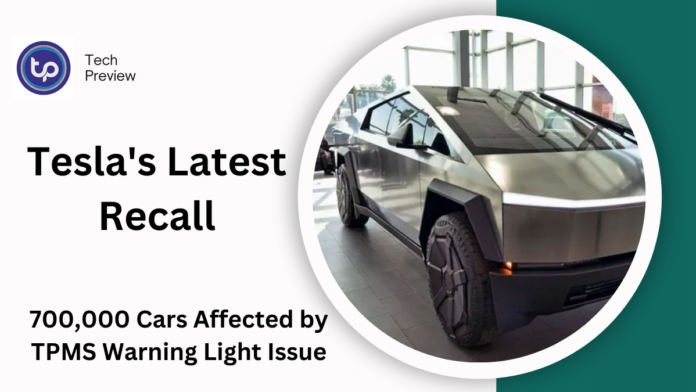Tesla has issued a significant safety recall that affects nearly 700,000 vehicles, including the highly anticipated 2024 Cybertruck, 2017-2025 Model 3, and 2020-2025 Model Y.
This recall stems from an issue with the Tire Pressure Monitoring System (TPMS), which could fail to properly alert drivers when tire pressure drops below safe levels.
According to the National Highway Traffic Safety Administration (NHTSA), this malfunction poses an increased risk of accidents due to inadequate warning of tire underinflation.
Why the Recall Was Necessary
The core issue with the affected vehicles lies in the malfunction of the TPMS, a critical system designed to warn drivers when tire pressure falls below safe thresholds.
Normally, if a problem with tire pressure is detected, a warning light will illuminate, notifying the driver of the issue. However, in these specific Teslas, when the system detects a problem and the vehicle is turned off or enters sleep mode, the warning light fails to persist between driving cycles.
This means that drivers may not receive an alert when starting their vehicle after it has been idle, putting them at risk of driving with improperly inflated tires.
MUST READ: Tesla’s Stock Journey: Insights and Predictions Ahead
The NHTSA emphasized that failing to address tyre pressure issues promptly can lead to increased tyre wear, reduced fuel efficiency, and, in more severe cases, tyre blowouts.
These risks elevate the likelihood of collisions, especially if the vehicle is being driven at high speeds or under heavy load conditions.
How Tesla is Addressing the Issue
In response to the recall, Tesla has already rolled out a free over-the-air (OTA) software update aimed at resolving the TPMS malfunction.
The update was released on November 15, 2024, and it ensures that the malfunction indicator light remains on between driving cycles. This software patch addresses the root cause of the issue and eliminates the risk of drivers missing an alert when they start their vehicle after it has been off for some time.
MUST READ: Will Tesla Split Its Stock in 2024 After TSLA’s Comeback?
Owners of affected vehicles are not required to visit a Tesla service center for repairs.
As long as the vehicles have received software update version 2024.38.7 or later, the issue is resolved. For those who have not yet received the update, Tesla will continue to push it remotely via its over-the-air update system.
Notifications and Further Actions
Tesla plans to send out owner notification letters to all affected vehicle owners by February 15, 2025, detailing the recall and informing them about the necessary steps to ensure their vehicle is properly updated.
Tesla owners who have already received the software update need not take any further action unless they encounter other issues with their vehicle.
This recall, though significant, does not appear to be linked to any reported accidents, injuries, or fatalities. Tesla and the NHTSA have emphasized that no crashes have been attributed to this particular issue, though it is considered important to address it proactively.
Tesla’s 2024 Recall History
This recall is part of a broader trend of recalls that Tesla has experienced in 2024. In fact, this is the 15th safety recall issued by the company this year. The Cybertruck, in particular, has been subject to numerous recalls in the past few months.
Just last November, Tesla recalled the Cybertruck over an issue with its drive inverter, which could lead to a loss of power to the wheels, potentially affecting acceleration. This marks the eighth recall for the Cybertruck in 2024 alone.
While recalls are not uncommon in the automotive industry, Tesla’s frequency of recalls has drawn attention.
The company is actively addressing these issues with software fixes and updates, yet the sheer volume of recalls raises questions about the overall reliability and safety of its vehicles.
The Impact of Recalls on Tesla’s Reputation
While Tesla remains one of the leaders in the electric vehicle market, its history of safety recalls has led some industry analysts and consumers to question whether the company’s rapid growth and technological innovation may be outpacing its quality control processes.
Despite these concerns, Tesla’s ability to swiftly implement fixes through software updates is seen as a strength, as it allows the company to resolve issues without requiring owners to bring their vehicles into service centers, thus minimizing inconvenience.
However, frequent recalls can affect consumer confidence, especially for potential buyers considering a Tesla. Safety recalls, particularly those that involve critical systems like tire pressure monitoring, may make some customers hesitant to purchase a Tesla vehicle, fearing potential future issues.
Conclusion
Tesla’s swift action to address the TPMS recall through an over-the-air update shows the company’s commitment to vehicle safety and customer satisfaction.
The recall highlights the importance of maintaining vehicle safety systems and ensuring that drivers are properly alerted to potential hazards.
While there have been no reports of accidents related to this issue, the recall serves as a reminder of the need for continuous monitoring and improvement of vehicle systems.
As Tesla continues to expand its vehicle lineup and ramp up production, the company will need to balance its cutting-edge innovation with rigorous safety protocols to ensure that it maintains the trust of its customers and the broader automotive community.
People May Ask
1. How can I check if my Tesla is affected by the recall?
If you own a 2024 Cybertruck, 2017-2025 Model 3, or 2020-2025 Model Y, you may be affected by this recall. Tesla will send out notification letters to owners of affected vehicles by February 15, 2025. You can also check your vehicle’s software version and ensure it is 2024.38.7 or later to confirm that the update has been applied.
2. Do I need to visit a service center for this recall?
No, you do not need to visit a service center. The recall issue is addressed through an over-the-air software update, which can be installed remotely. As long as your vehicle has the updated software version, no further action is required.
3. What should I do if I haven’t received the software update?
If you haven’t received the update yet, make sure your vehicle is connected to Wi-Fi and check for software updates through the Tesla app or vehicle settings. The update should be pushed automatically, but if you are having trouble, you can contact Tesla support for assistance.
4. Has this recall resulted in any accidents or injuries?
No, according to the NHTSA, there have been no reported accidents, injuries, or fatalities related to this TPMS issue. The recall was issued purely as a precaution to ensure driver safety.
5. What other recalls has Tesla had in 2024?
In addition to the TPMS recall, Tesla has issued several other recalls in 2024, including one for the Cybertruck concerning a potential issue with the drive inverter, and others related to software glitches and hardware malfunctions. Tesla has been working to address these issues with timely software updates and repairs.
Click here to learn more.








